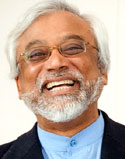
By Jamal Rahman, New Age Islam
28 May 2021
Today, There Are New Ways In Which People Are Expressing Their Religious Affiliation
Main Points:
1. One can be rooted in one religious tradition and open to the wisdom and beauty of other religious traditions.
2. One can be ‘Spiritual but not religious’, like a bee collecting nectar from different flowers.
3. Some atheists and agnostics are very spiritual people.
-----
I am a Muslim Imam at the Interfaith Community Sanctuary, a house of worship in Seattle, USA. In our house of worship, we have different kinds of congregants. What is exciting is that these congregants reflect new and emerging kinds of congregants all over America.
For example, there is one type of congregant like myself—someone who is rooted in one religious tradition but is open to the wisdom and beauty of other religious traditions. I am a Muslim, but I am open to wisdom in other religions. And when I learn from the insights and practices of other religious traditions, this waters my Islamic roots. I become a better Muslim and a more developed human being. In my personal experience I am now able to understand ‘my’ holy book more deeply. As a Muslim, I look at the Quran from the perspective of a Muslim. But if I look at the Quran from other perspectives also, it gives me a more complete understanding of ‘my’ holy book. Learning from other religious traditions and their scriptures has enriched my own understanding of the Quran.
We have a second type of congregant in our house of worship, the fastest growing category in America: ‘Spiritual but not religious’, or, as is jokingly said, ‘None of the above’. They can be described in a metaphorical way—as bees collecting nectar from different flowers.
Now, in the past, this category was criticized by some people as being akin to digging wells in many places. You dig in one place to a certain depth and then give up and go to another place to dig, and then to a third place, and so on. As a result, it was said, you never really reach the water level. To achieve depth and reach the level of where the water exists, it was said, you need to be steadfastly dedicated to digging one specific well—that is, to remain committed to one religious tradition. According to the critics, exploring and affiliating with multiple religious traditions is like digging in many places and, alas, not getting rewarded by the gift of water.
But this metaphor has been countered by another metaphor. The person who is spiritual but not religious and who benefits from the wisdom and beauty of many different religious traditions is actually digging one well, but is using more than one instrument for this purpose. They may be using two, three or four ‘instruments’. Maybe, they actually have a better chance of being able to achieve the required depth and discover water!
A third type of congregant is someone who follows and practices more than one religious tradition. This is sometimes called “multiple belonging.” To use a term from the American academic system, it is like a student who is studying and graduating with a double major. Some people might respond to this by likening it to a person having more than one spouse. If you have more than one spouse, it is not humanly possible for you to give all of them your attention equally. But this metaphor can be countered by another one. Identifying with more than one religious tradition can be said to be like a mother who has more than one child. Mothers who have more than one child know that it is indeed possible to divide their attention equally among all their children and to love them all equally.
There is yet a fourth type of congregant in our house of worship. This also constitutes a growing number in the USA—secular humanists, agnostics and atheists. Personally, I find them to be very religious, or better put, very spiritual people. In my understanding, they do indeed believe in God, but they just call God by a different name— for example, ‘Compassion’, Truth, or ‘Justice—any quality higher than human personality or human institutions.
The atheists and agnostics in our congregation are eager to learn spiritual practices such as meditation, which is universal and not determined by, or limited to, any one particular religion. Take, for instance, the practice of silence. There is no such thing as ‘Muslim silence’ or ‘Jewish silence’. It is just silence. The same holds true for practices of forgiveness or cultivating compassion. These spiritual practices are found in every major tradition, and one can gain benefits from them without identifying with any one particular religious tradition.
To complete my point, let me share this simple story. An atheist father tells his son, “Son, there is no God.” The son, who is trained to question, says, “Father, how do you know?” And the father replies, “Son, you’ve got to take it on faith”!
----
Based in the USA, Jamal Rahman is a popular speaker and author on Islam, Sufi spirituality, and interfaith relations. Along with his Interfaith Amigos, he has been featured in The New York Times, CBS News, BBC, and various NPR programs. Jamal is co-founder and Muslim Sufi Imam at Interfaith Community Sanctuary and adjunct faculty at Seattle University. He travels nationally and internationally, presenting at retreats and workshops. Jamal’s passion lies in interfaith community building and activism.
URL:




 Moderate Islamist here
Moderate Islamist here


0 comments:
Post a Comment